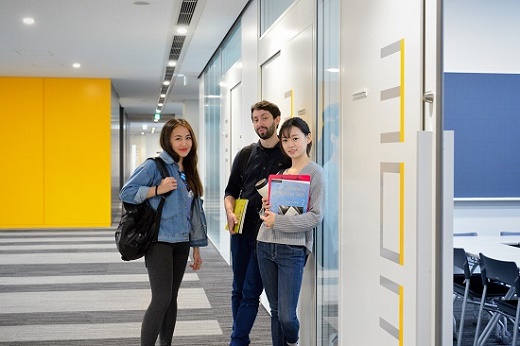
First-year courses focus on developing active learning skills by learning through a range of materials and media, a variety of skills such as information literacy, writing reports, and making presentations. Below is a list of required courses that must be completed in your first and second year. These courses are intended to give you an insight into academic studies and topics of Global Japanese studies.
REQUIRED COURSES
FIRST YEAR
・Introduction to Global Japanese Studies (2)
・Research Paper Writing (2)
・Speech and Presentation (2)
・Academic ICT Literacy (2)
・Basic Seminar in Global Japanese Studies (1)
SECOND YEAR
・Introduction to Academic Studies and Career Development (2)
Besides the required courses, you will register for elective and required elective courses.
As electives, most students start taking Japanese language courses in their first semester. SGJS offers eight levels of Japanese language courses. The course curriculum is specifically designed for English Track and exchange students. All English Track students are required to take a Japanese language placement test before their first semester starts, which allows us to provide an appropriate level of Japanese language education for each student. Credits earned from Japanese language courses will count towards GPA and graduation requirements. For more course details, please see our Japanese Language Program page.
REQUIRED COURSES
FIRST YEAR
・Introduction to Global Japanese Studies (2)
・Research Paper Writing (2)
・Speech and Presentation (2)
・Academic ICT Literacy (2)
・Basic Seminar in Global Japanese Studies (1)
SECOND YEAR
・Introduction to Academic Studies and Career Development (2)
Besides the required courses, you will register for elective and required elective courses.
As electives, most students start taking Japanese language courses in their first semester. SGJS offers eight levels of Japanese language courses. The course curriculum is specifically designed for English Track and exchange students. All English Track students are required to take a Japanese language placement test before their first semester starts, which allows us to provide an appropriate level of Japanese language education for each student. Credits earned from Japanese language courses will count towards GPA and graduation requirements. For more course details, please see our Japanese Language Program page.

There are no required courses from your third year, so you can build own curriculum depending on your interests. It is important that you understand and fulfill the credit requirements for each course area to graduate in a timely manner. Course schedules for an academic year become available at the beginning of each academic year (April). You can find course schedules and course descriptions here.
From your second year, you can enroll in a seminar. In seminar courses, students work on research topics under the supervision of the seminar professor. There is a screening process to enroll in a seminar at the end of your second year. About 80% of SGJS students (including students in Japanese Track) enter a seminar in their third year.
You can also take courses offered by other schools at Meiji University. While most of these courses are conducted in Japanese, their credits count toward your GPA and graduation requirements. Students with a strong command of Japanese can also enroll in courses taught in Japanese at other schools*.
*Some conditions apply for course registrations. Please confirm with the School Office before the course registration period if you are planning to take courses offered by other schools which are not part of the International Undergraduate Program.
From your second year, you can enroll in a seminar. In seminar courses, students work on research topics under the supervision of the seminar professor. There is a screening process to enroll in a seminar at the end of your second year. About 80% of SGJS students (including students in Japanese Track) enter a seminar in their third year.
You can also take courses offered by other schools at Meiji University. While most of these courses are conducted in Japanese, their credits count toward your GPA and graduation requirements. Students with a strong command of Japanese can also enroll in courses taught in Japanese at other schools*.
*Some conditions apply for course registrations. Please confirm with the School Office before the course registration period if you are planning to take courses offered by other schools which are not part of the International Undergraduate Program.


